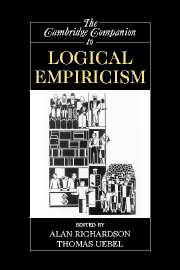Book contents
- Frontmatter
- Introduction
- Part I The Historical Context of Logical Empiricism
- Part II Logical Empiricism: Issues in General Philosophy of Science
- Part III Logical Empiricism and the Philosophy of the Special Sciences
- 7 The Turning Point and the Revolution: Philosophy of Mathematics in Logical Empiricism from Tractatus to Logical Syntax
- 8 Logical Empiricism and the Philosophy of Physics
- 9 Logical Empiricism and the Philosophy of Psychology
- 10 Philosophy of Social Science in Early Logical Empiricism: The Case of Radical Physicalism
- 11 Logical Empiricism and the History and Sociology of Science
- Part IV Logical Empiricism and its Critics
- Bibliography
- Index
- Series List
11 - Logical Empiricism and the History and Sociology of Science
from Part III - Logical Empiricism and the Philosophy of the Special Sciences
Published online by Cambridge University Press: 28 January 2008
- Frontmatter
- Introduction
- Part I The Historical Context of Logical Empiricism
- Part II Logical Empiricism: Issues in General Philosophy of Science
- Part III Logical Empiricism and the Philosophy of the Special Sciences
- 7 The Turning Point and the Revolution: Philosophy of Mathematics in Logical Empiricism from Tractatus to Logical Syntax
- 8 Logical Empiricism and the Philosophy of Physics
- 9 Logical Empiricism and the Philosophy of Psychology
- 10 Philosophy of Social Science in Early Logical Empiricism: The Case of Radical Physicalism
- 11 Logical Empiricism and the History and Sociology of Science
- Part IV Logical Empiricism and its Critics
- Bibliography
- Index
- Series List
Summary
INTRODUCTION
Our image of logical empiricism has changed dramatically during the last two decades. One of the entrenched views proven wrong was that the logical empiricists were not interested in the historical and social context of science and of philosophy of science. Today we know that some of the most important members of the Vienna Circle (especially Neurath, Carnap, Frank, and Hahn) were perfectly aware of the fact that their efforts to elaborate a new philosophical conception of scientific knowledge were by no means “neutral” in respect to the social conditions and political struggles of the time. Carnap's foreword to Der logische Aufbau der Welt in 1928 and the Vienna Circle's manifesto of 1929 are only the best known examples. Yet it is not that easy to find explicit answers to the questions of which part history and sociology of science should play in the “orchestrated” unified science (to borrow an expression Neurath adopted) and how the relation between history and sociology of science and philosophy of science should be conceived. To reconstruct such an answer is the purpose of this chapter.
THE SOCIO-HISTORICAL DIMENSION OF EARLY LOGICAL EMPIRICIST PHILOSOPHY OF SCIENCE
One reason why the aspect of logical empiricism that concerns us here has escaped attention for so long is that the type of contextualization of science which Neurath, Frank and Zilsel intended did not fit very well into the twentieth-century debates through which the sociology of science defined itself as an autonomous discipline. This holds for the debates in the 1920s and ’30s about the sociologies of science developed by Max Scheler and Karl Mannheim just as much as for Robert Merton’s, which dominated the international discussion in the 1940s and ’50s. In both cases the subject matter of the new discipline was delimited against two competitors: first, against Marxist social theory and its materialist thesis that being determines consciousness; second, against philosophy (with similar arguments as in the dispute about psychologism prior to World War I).
- Type
- Chapter
- Information
- The Cambridge Companion to Logical Empiricism , pp. 278 - 302Publisher: Cambridge University PressPrint publication year: 2007
- 13
- Cited by



